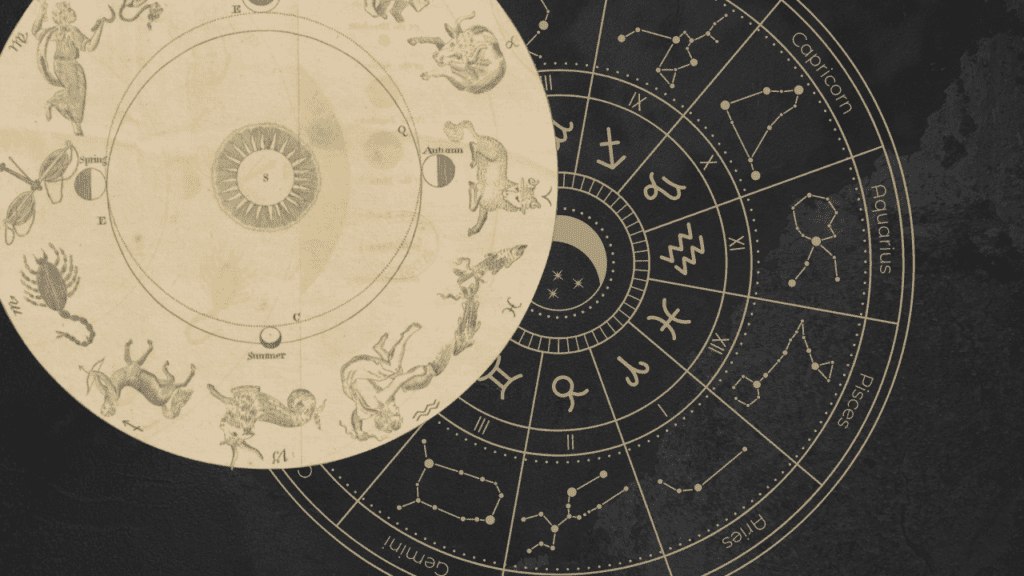Chinese astrology refers to the traditional astrological theory in China, which is based on traditional astronomy, calendar and philosophical knowledge. Chinese astrology has always been inseparable from astronomy and was completed from the Western Han Dynasty in the 2nd century BC to the Eastern Han Dynasty in the 2nd century AD.
Constellations
According to the constellations used in Chinese astrology, it can be divided into the solid star school, which uses Qiyao or the twenty-eight constellations, or the virtual star school, which uses virtual stars like Ziwei Dousu.
History
Astrology had already sprouted before the Shang Dynasty in China. The oracle bone tablets of the Shang Dynasty contain many astronomical records. In the early Ming Dynasty, Chinese astrology was once lost. It was not until the late Ming and early Qing dynasties that Western missionaries introduced astronomical calculation technology, which was passed down to later generations. In the early Ming Dynasty, Zhu Yuanzhang, the founding emperor of the Ming Dynasty, ordered the people to ban the practice of astronomy. No one knew about the astronomical calendar, and astrology almost became a must-have. At the end of the Ming Dynasty, Xu Guangqi and others began to learn astronomy and calculus from Western Christian missionaries, and Chinese astrology came to life.
Qing Dynasty
During the Qing Dynasty, Emperor Kangxi was fond of ancient books and cultural relics and became interested in astronomy and calendars. In addition to appointing scholars to learn astronomical knowledge from Western missionaries, he also collected ancient Chinese astrology books and compiled them into “Sikuquanshu” and “Collection of Ancient and Modern Books” etc. Ancient Encyclopedia. Based on Western learning techniques, knowledgeable Chinese people integrated their predecessors’ astrological concepts and began to develop local Chinese astrology.
Summary
Despite the efforts of a generation of scholars in the Qing Dynasty, astrology has yet to be popularized among the people. The main reason is that astrology has not been passed down for a long time. There are only a few people who know how to observe astronomy, and there are many errors and omissions in ancient astrology books. Zi had no way to get started, so astrology could only be taught in palace schools. Even if it is not banned by the government, astrology was a very professional knowledge in ancient times, and ordinary scholars rarely studied it.

On the other hand, fortune-telling techniques such as Ziping Bazi and Yi Gua divination are popular among the people. To a certain extent, they meet people’s needs for solving doubts. This just replaces the social function of astrology. Therefore, people are very interested in astrology, which can predict the future. Not eagerly.
By the early Republic of China, most fortune tellers who practised fortune telling only knew Bazi and Yi Gua. After World War II, some people began to recirculate Ziwei Dou Shu, which was similar to astrology.
Different ancient civilizations had many systems of astrology based on celestial bodies, and the methods had different names. There are also India and Japan. The Chinese Ziwei Dou Shu includes real stars and so-called virtual stars that modern people have not been able to find the opposite stars. However, its identity as a Chinese astrologist has still not been reduced. Since Ziwei Dou Shu is easier to learn than BaZi, it is quite attractive to the public. In the past few decades, there has been an endless stream of Ziwei Dou Shu books published in Hong Kong and Taiwan, and their popularity is even greater than that of Bazi.
Astrology in modern China
After the Communist Party of China established its power in mainland China in 1949, and after ten years of turmoil during the Cultural Revolution, it was difficult for old Chinese learning to survive, and superstitious knowledge such as astrology and numerology was even less allowed to be passed on. Mainland China is very unfamiliar with the Bazi and Ziwei Dou Shu famous in Hong Kong and Taiwan, but it has made room for the development of Western astrology.
The use of Tibetan astrology has been restricted after the democratic reforms in Tibet in 1959, but Tibetan astrology continues to be used.




